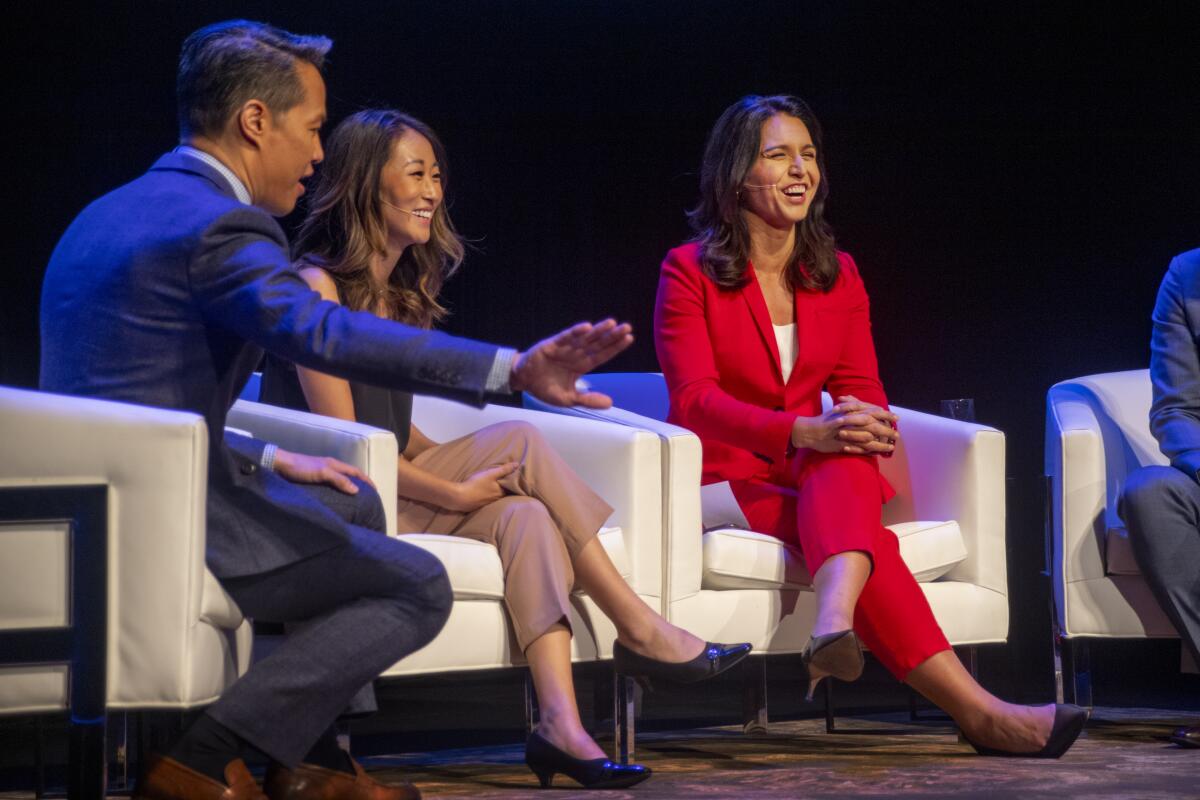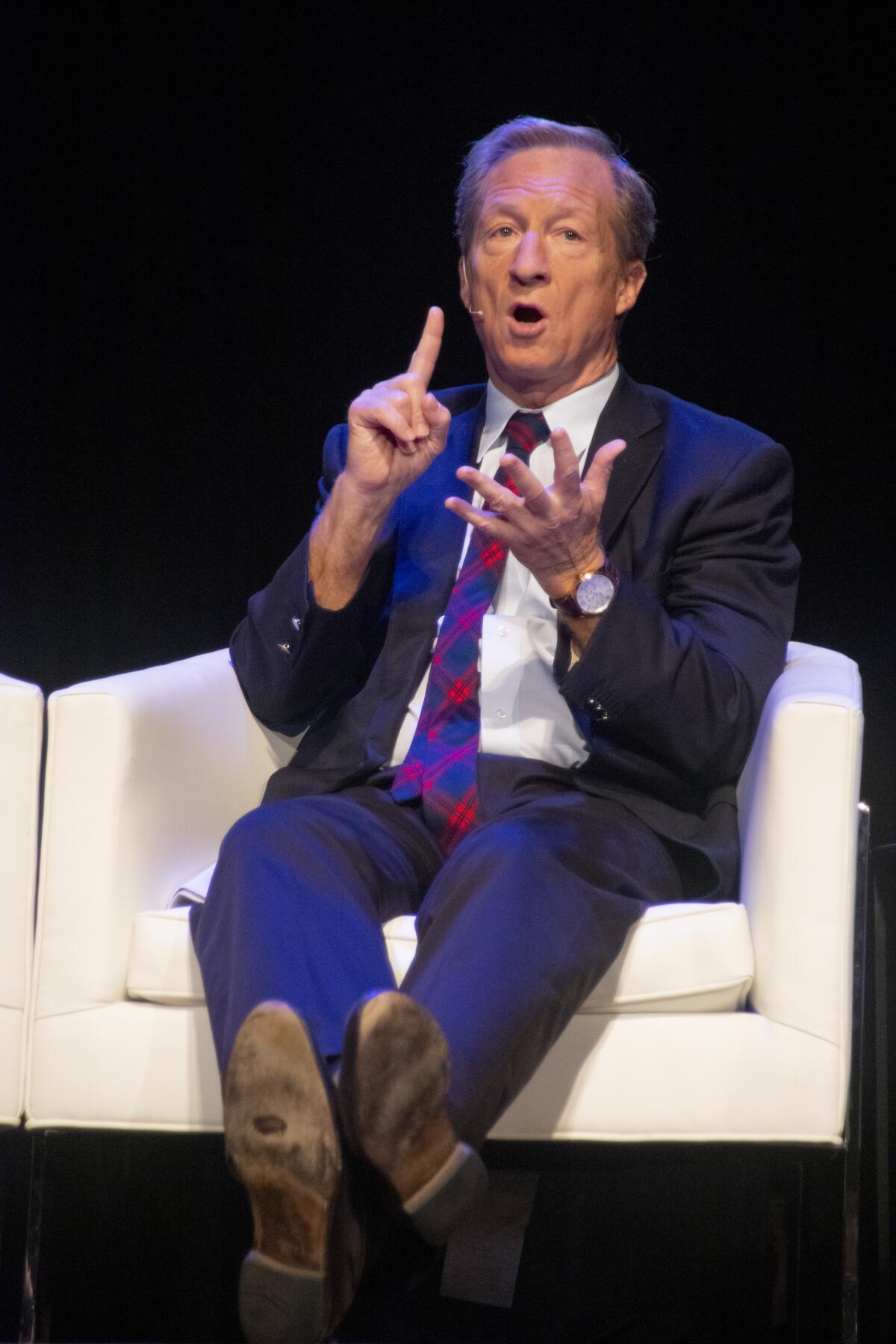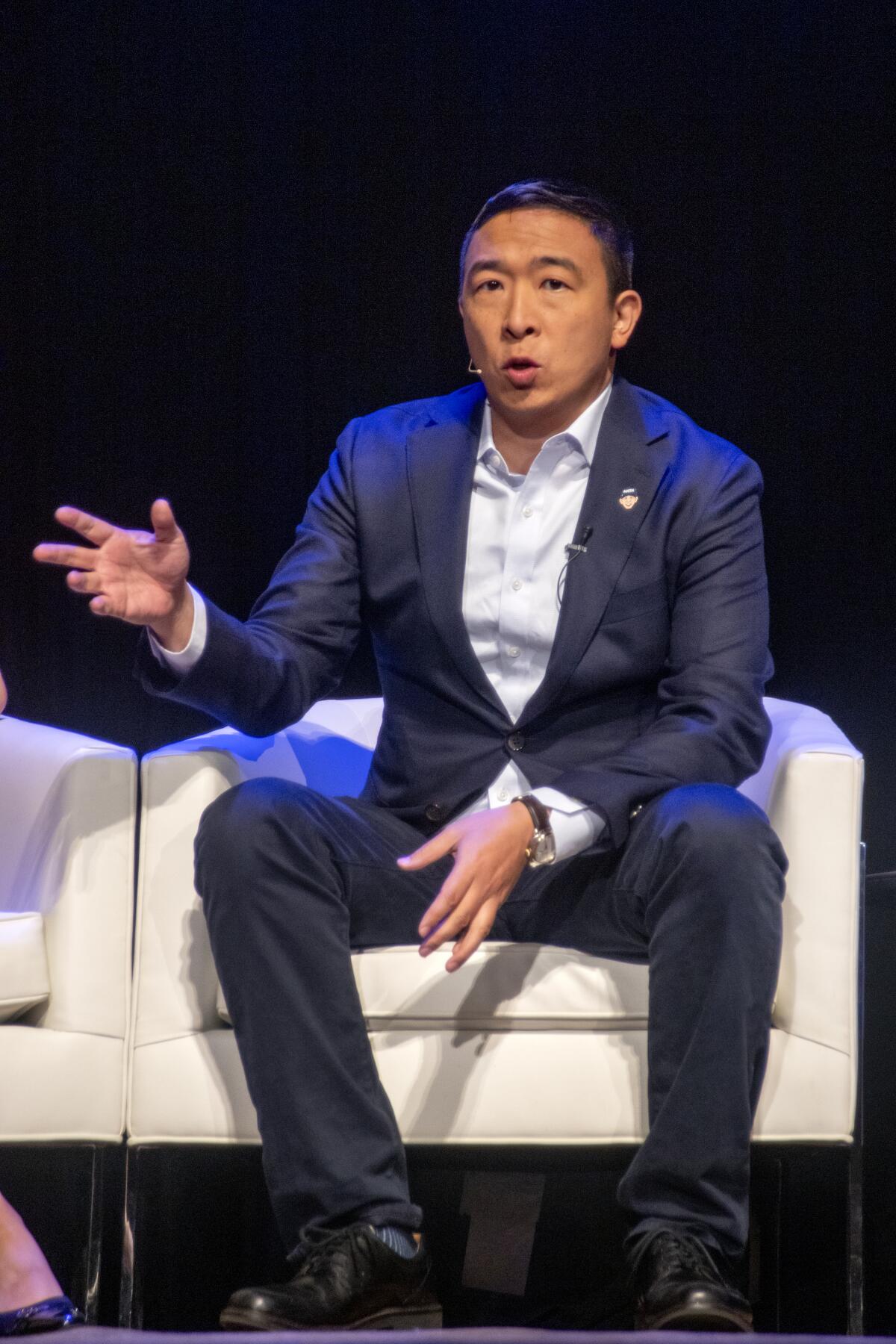Three Democratic presidential hopefuls state their case at forum in Costa Mesa

- Share via
Three candidates for the Democratic presidential nomination took the stage in Costa Mesa on Sunday at a forum organized by Asian American activist groups.
Tech entrepreneur Andrew Yang, billionaire hedge fund manager and political activist Tom Steyer and U.S. Rep. Tulsi Gabbard (D-Hawaii) took turns at the Segerstrom Center for the Arts answering a wide range of questions from panelists and the audience.
Author Marianne Williamson was expected to attend but canceled because of a scheduling conflict, organizers said.
Topics included healthcare, immigration, the economy and income inequality, as well as the rising influence of Asian Americans as a voting bloc. Hundreds packed the event at its outset around 9 a.m., though many left as it extended nearly six hours.
Organizers from the Asian Americans Rising PAC and the AAPI Victory Fund called the forum significant in light of Asian Americans and Pacific Islanders holding 28 seats in Congress.
“This is a first-in-a-lifetime event,” said Katie Kalvoda, president of the Asian Americans Rising PAC.
Rep. Judy Chu (D-Pasadena) noted how Asian American voters can help swing elections.
“We have gone from being marginalized to the margin of victory,” Chu said. “And that’s especially true here in Orange County.”
Gabbard, first elected to Congress in 2012, also is a major in the Hawaii Army National Guard and served two tours in the Middle East.
She said the United States has been on a war footing since 9/11, costing taxpayers trillions of dollars that otherwise could have gone to domestic causes such as healthcare and infrastructure. The country is waging “these wasteful, counterproductive wars” that have not helped national security, she said.
Under her foreign policy, Gabbard said, the United States would not be “world police” and that she would stand up to the military-industrial complex in Washington, which she claimed “has profited heavily from us being at war so long.”
Ending “wasteful wars … does not necessarily equate to isolationism,” she said. Rather, the United States should resolve differences through diplomacy and finding common interests, she added.
As a member of the House amid talk of possible impeachment proceedings against President Trump, Gabbard said she doesn’t support impeaching him because the country is already divided enough. Rather, she said, voters “are the ones who should throw him out of the White House” in 2020.

Steyer, who founded NextGen America, a political advocacy group, said he feels qualified to be president based on his years of activism fighting for things such as tobacco taxes and clean energy. He has urged impeachment of Trump.
“It isn’t like I just came to [politics],” Steyer said. “I’ve been doing this for 10 years.”
When asked how he, as a billionaire, can relate to everyday Americans, he said he travels the country, hearing varied stories and concerns. He noted how he has signed the Giving Pledge, a campaign for the wealthy to be philanthropic. He said he wants to close the income gap between the rich and poor.
Steyer said his candidacy is focused on fighting climate change and lessening the “corporate stranglehold” on government.
“We can have a better guaranteed lifestyle for every citizen than any country has ever provided,” he said.

Yang, founder of the nonprofit Venture for America, which works to train future entrepreneurs, told the audience about his childhood in upstate New York, where, as the son of Taiwanese immigrants, he was one of few Asians.
“You feel like your spot in this country is somewhat in question,” he said.
Yang highlighted his universal-income proposal, or “freedom dividend,” a $1,000 monthly stipend for all U.S. citizens over age 18. He said that unlike the bank bailouts during the recession a decade ago, “I would put resources directly into the hands of the American people.”
He urged a Medicare-for-all option that he said could drive more competition in the private healthcare market and curb rising costs.
Yang suggested making the Federal Emergency Management Agency independent of the Department of Homeland Security, saying it could help FEMA secure funding instead of competing with other Homeland Security interests.
Yang said climate change is “worse than you think” and urged investment in renewable energy, exporting that technology abroad, reviving ecosystems and even relocating people away from rising seas.
Yang, whose “Yang Gang” supporters helped him crowdsurf after his remarks, said his candidacy is unusual.
“A lot of people say, ‘You don’t sound like a politician,’ ” Yang said. “And I like that.”
Of the three candidates at Sunday’s forum, only Yang has qualified for Thursday’s Democratic presidential debate in Houston. Steyer has gained enough donor and polling support to join October’s debate in Ohio.
All the latest on Orange County from Orange County.
Get our free TimesOC newsletter.
You may occasionally receive promotional content from the Daily Pilot.






